Employee Training Platforms, often referred to as Learning Management Systems (LMS) or Training Management Systems (TMS), are software applications or web platforms designed to facilitate the planning, delivering, managing, and tracking of training programs for employees within an organization. They can cater to various training needs, from onboarding new hires to upskilling and reskilling of current employees.
Employee training is essential to enhance the skills, knowledge, and competencies of workers, ensuring that they perform their roles effectively. Different types of training cater to various needs and objectives within an organization. Here are some primary types of employee training:
Orientation/Onboarding Training:
Purpose: Introduce new hires to the company culture, values, policies, and basic job functions.
Content: Company history, values, benefits, expectations, safety procedures, and basic job duties.
Technical or Hard Skills Training:
Purpose: Provide employees with specific knowledge or skills needed for their job roles.
Content: Software usage, machinery operation, programming, data analysis, etc.
Soft Skills Training:
Purpose: Develop interpersonal and transferable skills.
Content: Communication, leadership, teamwork, problem-solving, time management, emotional intelligence, etc.
Safety and Compliance Training:
Purpose: Ensure employees understand and comply with industry regulations and safety standards.
Content: Occupational Safety and Health (OSH) standards, industry-specific regulations, ethical guidelines, etc.
Product Knowledge Training:
Purpose: Equip employees with knowledge about a company’s products or services.
Content: Product features, benefits, usage guidelines, and potential customer queries.
Pro Tip
You can build engaging online quizzes with our free online quiz maker.
Sales and Customer Service Training:
Purpose: Improve the skills of employees who interact directly with customers.
Content: Sales techniques, customer service etiquette, handling complaints, upselling, etc.
Leadership and Management Training:
Purpose: Prepare employees for leadership roles or enhance current managers’ skills.
Content: Strategic thinking, decision-making, people management, project management, etc.
Quality Training:
Purpose: Ensure employees understand the standards and procedures to maintain product/service quality.
Content: Quality assurance techniques, Total Quality Management (TQM) principles, Six Sigma, etc.
Below, we’ve compiled a list of the best online employee training platforms from around the web, you can explore the tools and choose the right one for your business.
- 1. OnlineExamMaker
- 2. Docebo
- 3. Litmos
- 4. Bridge
- 5. Cornerstone OnDemand
- 6. Moodle
- 7. LearnUpon
- 8. Lessonly
1. OnlineExamMaker
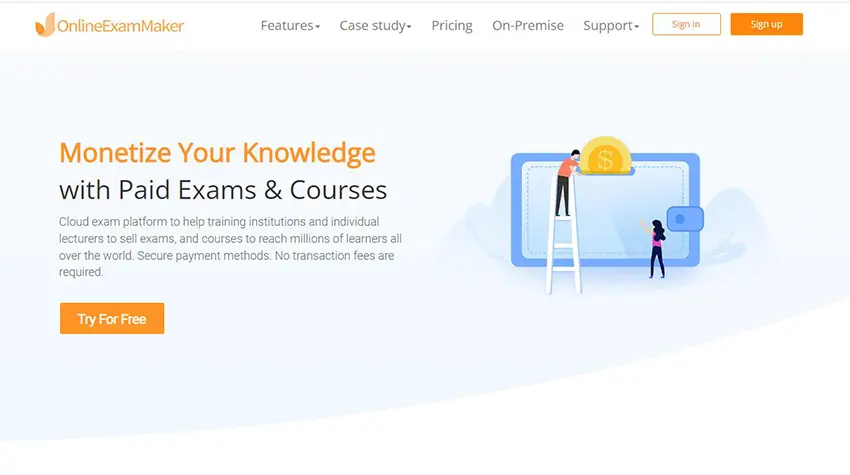
OnlineExamMaker is a highly versatile cloud learning management software that streamlines the process of compliance and corporate training for a variety of businesses. The platform provides tools to create courses, communicate with learners, and track performance. It also supports multiple content types, from videos to documents, allowing trainers to create diverse and engaging learning experiences. Integrated gamification tools add an element of competition and fun, enhancing user engagement.
Save time and effort with automated grading, instantly generating scores and results for each respondent. OnlineExamMaker grades your quizzes automatically, and provides valuable insights for performance evaluation. OnlineExamMaker quiz maker is a reliable and efficient solution that streamlines the assessment process for improved learning outcomes.
Key Features:
• Surveys and feedback forms for gathering learner insights.
• E-commerce functionality for selling exams and courses online.
• User roles and permissions for effective user management.
• Compliance training features with audit trails and certifications.
• Independent learner dashboards for tracking individual performance.
• Social learning features for peer interaction and knowledge sharing.
• Single sign-on (SSO) integration for seamless user authentication.
• API and integrations for connecting with other software tools.
Create Your Next Quiz/Exam with OnlineExamMaker
2. Docebo
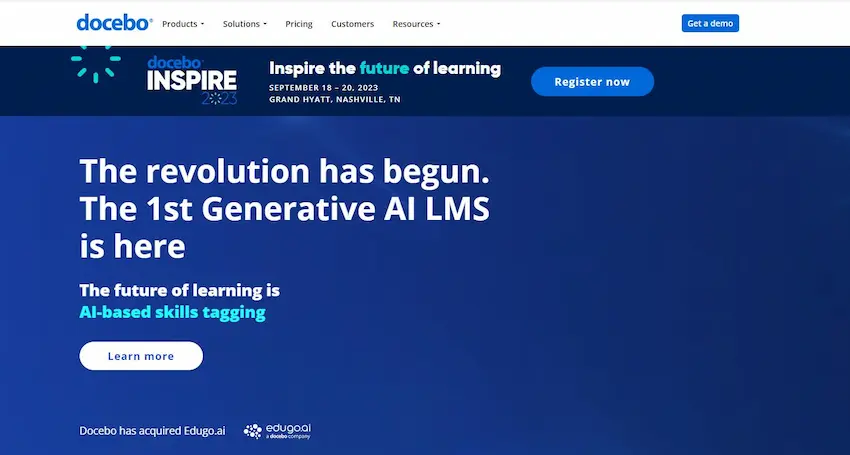
Docebo is a robust, AI-powered LMS designed for scalable learning experiences. It leverages artificial intelligence to deliver personalized learning paths, content, and recommendations, making each learner’s experience unique. With a range of integrations and native functionalities, Docebo covers the entire learning lifecycle, from content creation and delivery to analytics and reporting. Its extensive feature set is ideal for larger organizations or those with complex training needs.
Key Features:
• Customizable Course Creation
• Interactive Content Support
• Mobile and Responsive Interface
• Comprehensive Reporting and Analytics
• User-Friendly Navigation
• Advanced Gamification Options
• Multi-language and Global Support
• Integrations with CRM and HR Systems
• Real-time Progress Tracking
• Automated Course Reminders
• Social Learning Communities
3. Litmos
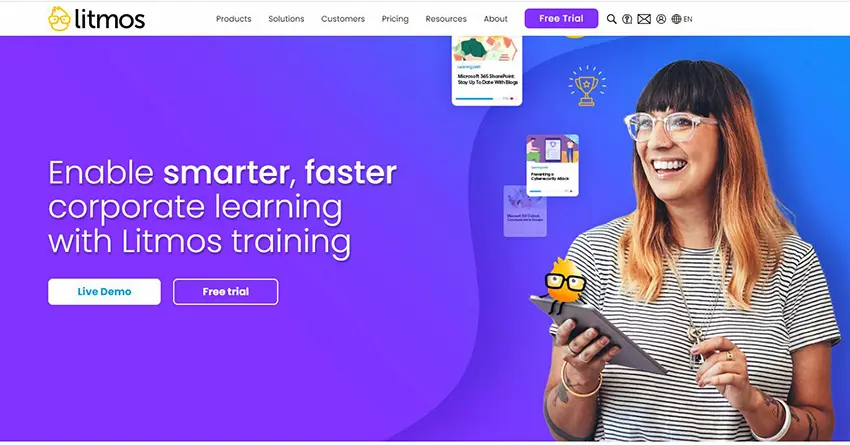
Litmos by SAP is a cloud-based learning platform that unifies learning management, the extended enterprise, and prepackaged content. It’s designed with the end-user in mind, making it incredibly user-friendly for both learners and administrators. The platform offers built-in solutions to accommodate global audiences, including multi-language courses and localized content.
Key Features:
• Course Builder: Enables administrators and trainers to easily create web-based courses by adding and organizing content, quizzes, surveys, and other learning materials.
• Content Libraries: Litmos has a preloaded content library with a wide range of professionally created courses on various topics, allowing for instant course assignment.
• Mobile Learning: Provides a mobile-responsive design and dedicated apps to allow learners to access courses anytime, anywhere.
• E-Commerce Integration: Organizations can sell their courses online using Litmos’s integrated e-commerce functionalities, which support multiple payment gateways.
• Assessments and Quizzes: Offers built-in tools to create assessments, quizzes, and surveys to gauge learner comprehension and collect feedback.
• Gamification: Engages and motivates learners with points, badges, and leaderboards to encourage competition and boost course completion rates.
• SCORM & xAPI Compliance: Supports SCORM and xAPI standards, making it easy to import and deploy standardized course content.
4. Bridge
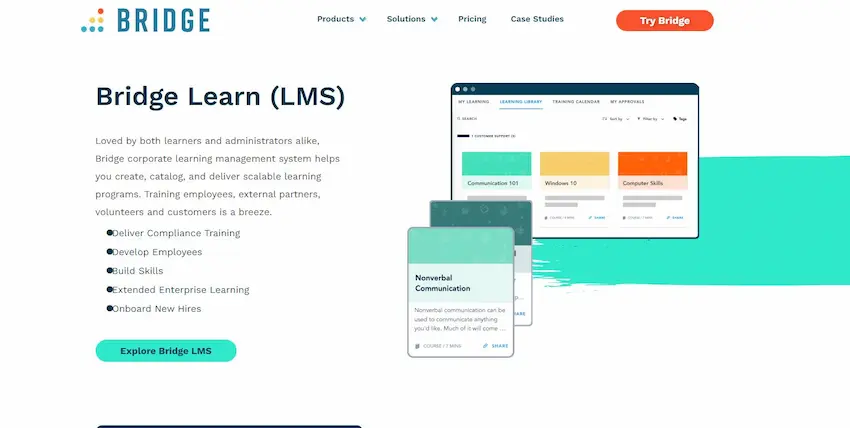
Bridge is an employee development platform that combines learning management, career & succession planning, and employee engagement. It’s built specifically for companies looking to boost employee engagement, skill development, and retain talent. The platform’s primary focus is on developing, retaining, and promoting internal talent to align with business goals.
Key Features:
• Personalized Learning Paths: Tailor training based on employee roles and responsibilities.
• Content Recommendations: Access relevant courses and resources.
• Analytics and Reporting: Track learner progress and training effectiveness.
• Multi-Language Support: Deliver content in multiple languages for diverse workforces.
• Compliance Training: Ensure adherence to industry regulations and standards.
• Customer Service Training: Improve service quality with specialized courses.
• Health and Safety Training: Promote a safe work environment with essential training.
• Mobile Learning: Access courses on any device for flexible learning.
5. Cornerstone OnDemand
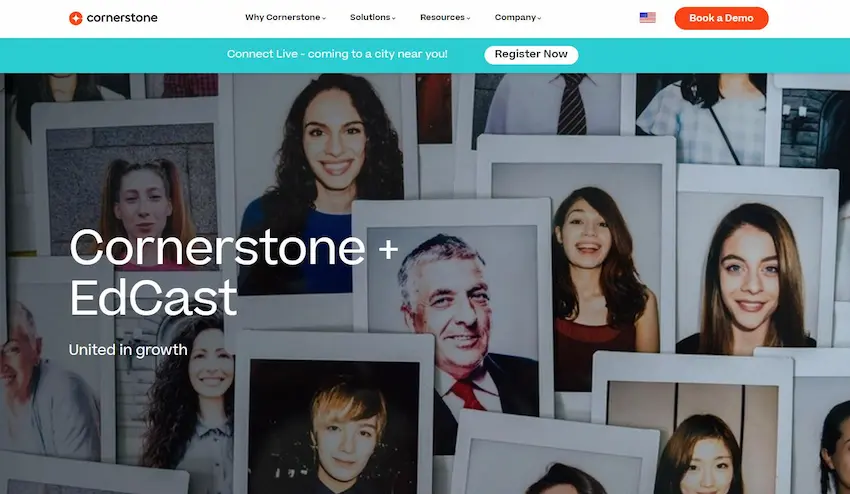
Cornerstone OnDemand is a comprehensive learning and talent management system. It offers tools for recruiting, customized learning, performance tracking, and human capital management. With a suite of products designed to aid in cultivating skills, managing talent, and driving business growth, Cornerstone serves both the educational aspects and broader HR needs of an organization.
Key Features:
• Role-Based Access: Control user permissions based on roles and responsibilities.
• Discussion Forums: Facilitate peer-to-peer interactions and Q&A sessions.
• Video Conferencing Integration: Host live training sessions and webinars.
• Real-time Notifications: Keep learners informed with updates and reminders.
• Data Security: Safeguard sensitive information with robust encryption.
• API Integrations: Seamlessly connect with other business systems.
• Surveys and Feedback: Gather insights to improve the learning experience.
6. Moodle
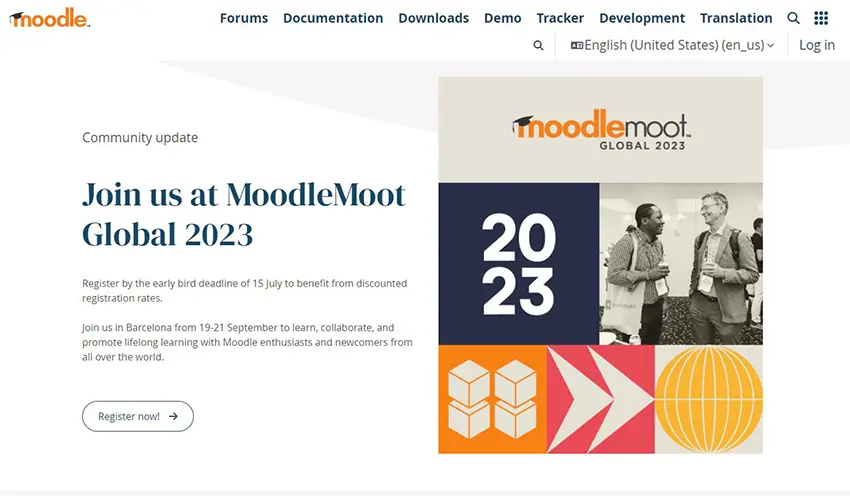
Moodle is an open-source learning management system designed to provide educators and learners with a single system for personalized learning. Used worldwide by universities, schools, and corporations, Moodle facilitates online learning with a platform that’s both flexible and feature-rich. Being open-source, it’s particularly popular among institutions with custom needs or those looking to integrate with specific third-party applications.
Key Features:
• Course creation and customization options.
• Collaborative learning tools for student engagement.
• Multimedia integration for interactive content.
• Assessment and grading capabilities.
• Messaging and communication features.
• Extensive plugin and integration support.
• Multilingual support for diverse learners.
• Open-source and community-driven development.
• Discussion forums for student interaction.
• Assignment submission and feedback.
7. LearnUpon
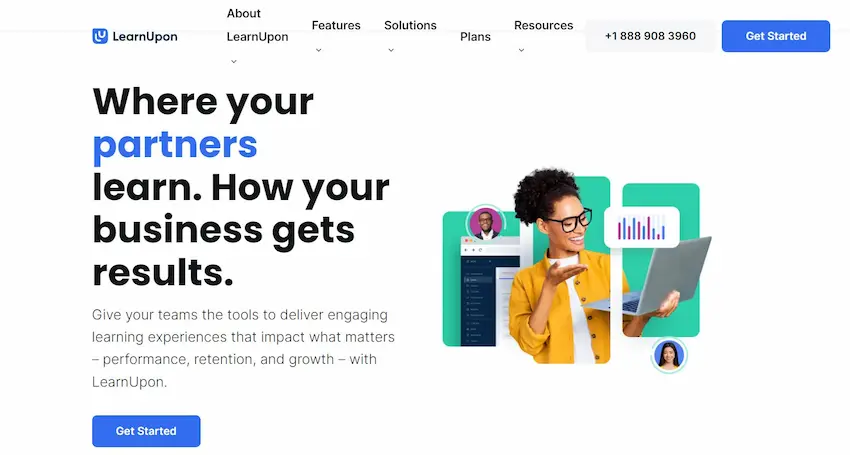
LearnUpon is a cloud-based LMS that’s designed for both internal employee training and external partner training. It combines user-friendliness with powerful functionalities, catering to businesses looking for swift setup and broad scalability. With features that support course selling, content creation, certification, and more, LearnUpon provides a unified solution for diverse training needs.
Key Features:
• Comprehensive reporting: Track learner progress and performance with detailed analytics.
• API and integrations: Seamlessly connect with other tools and systems for enhanced functionality.
• Mobile-friendly design: Access courses and content on any device for flexible learning.
• Custom branding: Tailor the LMS to match your organization’s identity and style.
• Compliance management: Easily handle training requirements with automated compliance features.
• User management: Effortlessly organize and manage learner accounts and permissions.
• Certifications and qualifications: Issue custom certificates upon course completion or mastery.
• Interactive discussions: Foster learner engagement with discussion forums and chat features.
• Learning paths: Create structured learning journeys based on learner goals and roles.
8. Lessonly
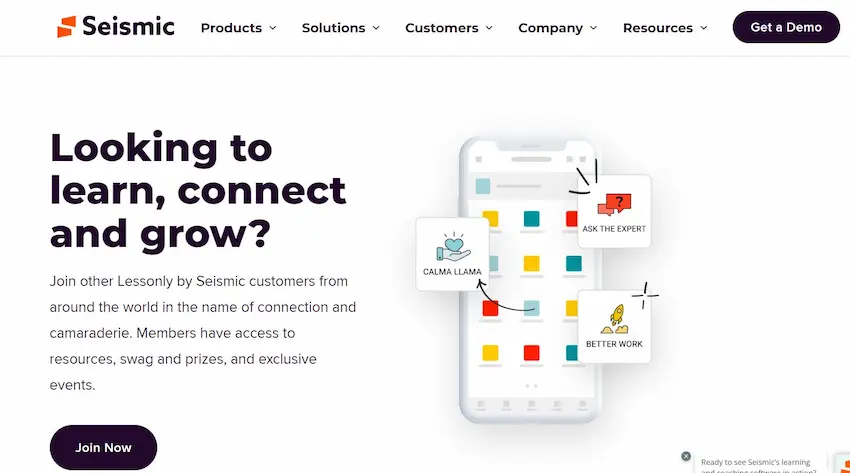
Lessonly is a powerfully simple training management software that helps teams learn, practice, and perform like never before. Businesses rely on Lessonly to empower their teams to stay ahead of the competition and deliver top-notch customer service. It’s particularly focused on practice and feedback with interactive features that enable users to practice their skills and get feedback for continuous improvement.
Each of these platforms offers unique features and is tailored to different business needs. Depending on the size, goals, and specific requirements of the organization, the best platform choice may vary.
Key Features:
• Simple Course Creation: The platform offers a user-friendly interface for creating and updating lessons, making it accessible for non-technical users.
• Practice & Feedback: Lessonly has a feature that allows users to practice skills and receive feedback, enhancing hands-on learning and improving performance.
• Learning Paths: You can create sequential learning modules for more comprehensive training, ensuring that employees understand foundational concepts before moving onto more advanced topics.
• Interactive Quizzes: After lessons, quizzes can be incorporated to test knowledge retention and understanding.
• Tracking & Reporting: Comprehensive tracking tools monitor learner progress, completion rates, and quiz scores, offering insights into areas that might need further emphasis.
• Integrated Learning: Lessonly can be integrated with various tools, such as CRMs and customer service platforms, to embed learning directly into the workflow.
• Automated Learning Assignments: Automate lesson assignments based on triggers like hiring dates, ensuring timely training without manual intervention.
• Searchable Content: The system allows users to search through training content, making it easy for employees to find and revisit specific lessons or topics as needed.